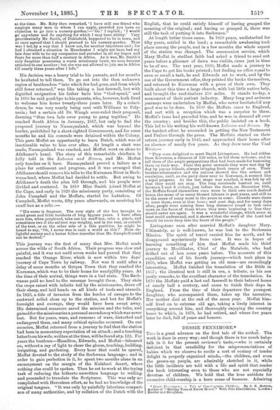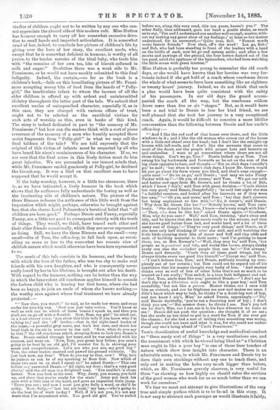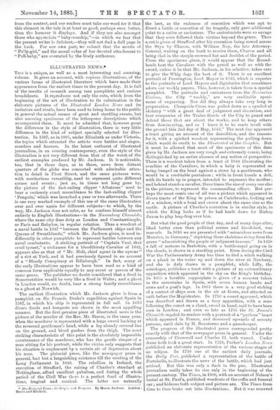DESSIE FENNIMORE.*
THIS is a great advance on the first tale of the autho.r. The work is finer in every way; and though there is too much baby- talk in it for the present reviewer's taste,--who is certainly deficient in that sensibility for the mispronunciations of babies which we observe to excite a sort of ecstasy of tender delight in properly organised minds,—the children, and even the grown-up people, are admirably sketched in it, while the little incidents are told with a life and spirit that render the book interesting even to those who are not especially devotees of children. We hold that the true antidote for excessive child-worship is a keen sense of humour. Admiring • Dessie Fennimore : a Tale of Conn fry•town Children. By S. K. Hutton, Author of " Holiday Time at Forest House." With Eve Illustrations. landone Hodder and Stoughton.
studies of children ought not to be written by any one who can- not appreciate the absurd side of this modern cult. Miss Hutton has humour enough to carry off her somewhat excessive devo- tion to small hands and imperfect articulation. It is somewhat cruel of her, indeed, to conclude her picture of children's life by giving over the hero of her story, the excellent uncle, who, except that he is somewhat deficient in humour, is worthy of all praise, to the tender mercies of the ideal baby, who feeds him with "the remains of her own tea, bits of biscuit softened in
milk and sugar." Doubtless there was a weak side to Mr. Fennimore, or he would not have meekly submitted to this final
indignity. Indeed, the curtain,—so far as the book is a children's book,—falls on this humiliating picture of Mr. Fenni- more accepting messy bits of food from the hands of "Polly- girl," the inarticulate infant to whom the incense of all the elder children is offered up with ardent and unintermitted idolatry throughont the latter part of the tale. We submit that excellent uncles of unimpeached character, especially if, as in this case, they are charged with various offices of trust, ought not to be selected as the sacrificial victims for such acts of worship as this, even in books of this kind. The story is indeed dedicated in part to "the memory of Mr. Fennimore ;" but how can the readers think with a sort of pions reverence of the memory of a man who humbly accepted those moist fragments from "Polly-girl" in what we may call the final tableau of the tale? We are told expressly that the original of this victim of infants must be respected by all who have heard his niece's reminiscences of his character. If so, we are sure that the final scene in this lively fiction must do him great injustice. We are persuaded in our inmost minds that, while Mr. Fennimore smiled graciously at Polly-girl, he declined the biscuit-sop. It was a libel on that excellent man to have supposed that he would accept it.
If the baby-worship, however, is a little too strenuous, there is, as we have intimated, a lively humour in the book which shows that its authoress fully understands the boring as well as
the fascinating side of children's nature. The picture of the three Binnses redeems the authoress of this little work from the imputation which might, perhaps, otherwise be brought against her, that she shares Lord Palmerston's heretical belief that "all children are born good." Perhaps Dessie and Fanny, especially
Fanny, are a little too good to correspond strictly with the truth of things. They would, we think, have teased each other and their elder friends occasionally, which they are never represented as doing. Still, we have the three Binnses and the small—very small—fibs of Tom, the office-boy, to fall back upon, as recon- ciling us more or less to the somewhat too roseate view of childish nature which would otherwise have been here represented to us.
The merit of this tale consists in its humour, and the beauty with which the love of the father, who was too shy to make real friends with his own daughter, and who is consequently never really loved by her in his lifetime, is brought out after his death. With regard to the humour, nothing can be better than the way in which the benevolent old coachman applies himself to console the forlorn child who is leaving her first home, where she had been so happy, to join an uncle of whom she knows nothing,— the worthy man against whose final treatment we have already protested :—
"'Now then, you watch !' he said, as he made her warm and snug under his own big rug. Now you just take notice. You'll know as well as well can be which of these beasts I speak to, and then you shall see us go off with a flourish. Now, Bess, my girl!' he cried out, in a loud cheery voice, you show this little lady if you know who I'm talking to ;' and the ' off ' leader,—that is, the right-hand leader of the team,—a powerful grey mare, pat back her ears, and shook her head high in the air in answer to the call. Now, what do you say to that ?' the old coachman asked, stooping down to look into Dessie' face. Dessie smiled through her tears, and he was satisfied with his enemas, and went on. 'Now, Tom, you great lazy fellow, you aren't going to be beat by an old girl, I'll answer for it, in showing your sense and comprehension. Let's see who you are, my good boy !' Tom, the other leader, snorted and pawed the ground violently. Do just look now, my dear ! What do you say to that, now ? Why, he's as jealous as can be of my speaking to Bess first. Now which of these two next to us shall I speak to?' he asked Dessie.—' This one before me,' answered Dessie.—' All right, my dear ; that's a very good Choice,' said the old man in a delighted tone. Yon couldn't 'a chose better. Now you look at his ears. Why, Jerry, you scamp, you hold up, and show that you're ready for the start.' Jerry put back his ears with a little toss of the head, and gave an impatient little jump.
• There you are ; and now I must just give Sally a word, or she'll be sulky. Now, Sally,—" last but not least," my lass,—who's going to do the beat bit of work to-day ? Well, if it's not you, it's not any mare that I'm acquainted with. You good old girl. You've pulled before me, along this very road, this ten years, haven't you ?' The sober Sally, thus addressed, gave her head a gentle shake, as much as to say, 'You and I understand one another well enough, master, with- out my making any great show of my feelings;' at least so her master understood, for he answered,—' Quite true, Sall. "Fewest words make fastest friends." Now then, off's the word ! Let go, Bob ;' and Bob, who had been standing in front of the leaders with a hand on the bridle of each, now let go and sprang aside ; and after a few snorts and pawinga of the ground, the four horses dashed oat of the inn yard, amid the applause of the bystanders, who had been watching the little scene with great interest."
Miss Hutton is probably too young to remember the old coach days, or she would have known that her heroine was very for- tunate indeed if she got hold of a coach whose coachman drove the whole of what seems to have been something like an eighteen or twenty hours' journey. Indeed, we do not think that such a plan would have been quite consistent with the safety of his passengers. In our old days the guard accom- panied the coach all the way, but the coachman seldom drove more than five or six "stages." But, as it would have been a sad trial to Dessie to lose her kind friend, we are well pleased that she took her journey in a very exceptional coach. Again, it would be difficult to conceive a more lifelike conversation than the following between Dessie and her uncle's office-boy :—
"'And I like the red roof of that house over there, and the little windows in it ; and I like the old woman who comes out of the house with a little red shawl over her head ; bat I don't like the straight-up houses with tall roofs, and I don't like the servants that come to most of the doors, nor the people with proper hats and bonnets on and umbrellas. I want to go somewhere where there are not all those things. Can't we go, Tom ?' Dessie looked up at Tom. Tom swung his leg backwards and forwards as he sat on the arm of the big chair opposite to hers, and thought.—' Not on club days I couldn't go,' he said ; but when it wasn't club days, I know Mr. Green would let you go about his farm where you liked, and that's near enough— quite near.'—' Do let us go,' said Dessie ; and may we take Fanny Packer with us Oh yes, of course,' said Tom. We get our milk and butter and eggs from Mr. Green's, and he thinks a lot of Bab, which I know I don't,' said Tom with great decision.—' Uncle thinks her very good,' said Dessie, thoughtfully ; he said last night she was "a faithful creature, and looked after his interests as if they were her own." Oh yes, and more,' said Tom ; but that don't prevent her being unpleasant to live with.'—' No, it doesn't,' said Dessie. Why does Mr. Green like her ?'—' Nobody knows,' said Tom care- lessly. 'She doesn't flatter him, I know—she's very rough with him.' = Then why does he like her?' asked Bessie again.—'Goodness, Miss, why do you care ? Well,' said Tom, thinking, she's clean and tidy, and he knows that she has meals ready to the minute, and that she knows good butter from bad, and works hard, and a lot of them nasty sort of things.'—' They're very good things,' said Dessie, as if she were only half thinking of what she said, and still watching the little birds carrying their bits of straw and fluff and tiny odds and ends of building material to their nests ; 'and I'm getting to know them, too, at Mrs. Barnes's.'—' Well, they may be,' said Tom, but people as is punctual and tidy, and works like horses, always thinks every one else the wickedest people that can be.'—' Not always,' Dessie said dreamily. Uncle does all these good things, but he always thinks every one good like himself.'—' Except me,' said Tom. I can't believe that, Tom,' said Dessie, suddenly rousing up com- pletely out of her reverie ; but Tom could not be argued out of his conviction that his master thought very badly of him. And master thinks ever so well of lots of other folks that's not so much to be trusted as I am really,' Tom ended, in a tone both indignant and sad. = But, Tom, uncle does like you,' persisted Dessie.—' I don't say he don't the way a Christian man ought to like a poor boy,' said Tom scornfully, but not like a person. Master thinks, coz I once told him an untruth, and coz he frightens me now and makes me seem I didn't know which way to look, he thinks I'm a deceiving sort of boy, and you know I ain't, Miss,' he asked Bessie, appealingly.—' No: said Dessie decidedly, you're not a deceiving sort of boy ; I don't think you are.'—' But master does ; he thinks I am. Don't you tell me he don't, Miss, coz I can see it in his face whenever be looks at
me Dessie did not push the question ; she thought it of no use ; bat she made up her mind to put in a word for Tom if she ever got the chance ; for she had a sort of inkling that something was wrong, though she could not have said what it was, for she could not under- stand any one's being afraid of 'Uncle Fennimore: "
Tom's classification of useful knowledge and methodical conduct as "them nasty sort of things" is a very meritorious one, and the resentment with which he viewed being liked as" a Christian man ought to like a poor boy" is one of those finer touches ot nature which show true insight into character. There is an admirable scene, too, in which Mr. Fennimore and Dessie try to darn their own stockings without any one to teach them, and only end in making the holes very much bigger than before, which, as Mr. Fennimore gravely observes, is very useful for them "as showing us how highly we should value the services of the good women who work for us so much better than we can work for ourselves."
We fear we must not attempt to give illustrations of the very true and simple pathos which is to be found in this story. It is not easy to abstract such passages as would illustrate it fairly,
from the context, and our readers must take our word for it that this element in the tale is at least as good, perhaps even better, than the humour it displays. And if they are also amongst those who appreciate "baby-worship,"—in which we fear that the present wr;ter is deficient, —they will not find a dull page in the book. For our own part, we submit that the merits of "Polly-girl," and the moral value of her devoted attachment to "Poll-baby," are overrated by the lively authoress.








































 Previous page
Previous page